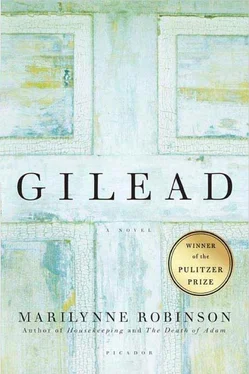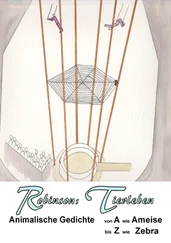I don’t think I do my heart much good by remembering these things. My point is that he was always a mystery, and that’s why I worry about him, and that’s why I know I can’t judge him as I might another man. That is to say, I can’t assign a moral valuation to his behavior. He’s just mean. Well, I don’t know that that is true of him now. But I do see what he might injure. That is very clear to me. While I was standing there in the pulpit, the thought came to me that I was looking back from the grave and there he was, sitting beside you, grinning up at me. This is not doing me any good at all; I’d better pray.
I woke up this morning to the smell of pancakes, which I dearly love. My heart was a sort of clayey lump midway up my esophagus, and that after much earnest prayer. Your mother found me sleeping in my chair and slipped my shoes off and put a quilt over me. I do sometimes sleep better sitting up these days. Breathing is easier. I was careful to put this diary away before I turned the light out last night. I know I still have thinking to do on this matter of Jack Boughton.
***
It is my birthday, so there were marigolds on the table and my stack of pancakes had candles in it. There were nice little sausages besides. And you recited the Beatitudes with hardly a hitch, two times over, absolutely shining with the magnitude of the accomplishment, as well you might. Your mother gave a sausage to Soapy, who slunk off with the unctuous thing and hid it who knows where. She is beyond doubt the descendant of endless generations of vermin eaters, fat as she is, domesticated as she ought to be.
I hate to think what I would give for a thousand mornings like this. For two or three. You were wearing your red shirt and your mother was wearing her blue dress.
And your mother has found that sermon I was wondering about, that Pentecost sermon, the one I gave the first time I saw her. It was beside my plate, wrapped in tissue paper, with a ribbon on it. “Now, don’t you go revising that,” she said. “It don’t need revising.” And she kissed me on the top of the head, which, for her, was downright flamboyant. So now I am seventy-seven.
Yesterday was very fine altogether. Glory came by in her car and took us for a picnic over by the river. Tobias came along, Tobias the good. There were balloons and even firecrackers, and there was a chocolate cake with chocolate frosting. The river was low but pretty, with the first yellow leaves drifting down to it. I was sorry I had not slept better the night before, that there was so much unease in the region of my heart. But the party went on cheerfully enough anyway. Glory and your mother are good friends now, and you and T. would have happily spent forever racing leaves down that river and generally puddling around in it.
Last night I slept fairly well.
It bothers me to think I might be bothered to death, if you see what I mean. Jack Boughton is home, to the delight of his father, my dear friend. For all I know, he has done no harm, and for all I know, he intends no harm. And yet the mere fact of him troubles me.
You asked if he was not coming along on the birthday jaunt. You were disappointed. Glory made some sort of excuse, and your mother said nothing. The tact was audible. I have to wonder what they know, what they have talked about. How could they not pity him? I pity him. I regret absolutely that I cannot speak with him in a way becoming a pastor, knowing as I do what an uneasy spirit he is. That is disgraceful.
It is one of the best traits of good people that they love where they pity. And this is truer of women than of men. So they get themselves drawn into situations that are harmful to them. I have seen this happen many, many times. I have always had trouble finding a way to caution against it. Since it is, in a word, Christlike.
He has not replied to the note I sent him.
I wrote another note, telling him how deeply I felt any fault lay with me, and so on, and carried it over to Boughton’s myself. I was just going to slip it in the mailbox, but Jack was out in the garden and he saw me and so I took it over to him. He actually seemed to shy from it a little. I told him it was another apology, more considered than the first one had been, and then he thanked me for it, and I am sure I saw genuine relief in his expression. I suspect he had not read the earlier note, perhaps thinking there might be some sort of rebuke in it. He did open the one I handed him and he read it over and then he thanked me again.
I said, “If you would like to talk, I would be happy to see you anytime.”
And he said, “Yes, I do want to talk with you, if you’re sure it’s all right.” So we’ll see what comes of that.
I was pleased that it all fell out so agreeably. It took a weight from my heart. I’ll admit it was one part of my motive in writing the second note that I didn’t want your mother pitying him for any hurt I had done him. Still, I felt good about it.
I enjoyed seeing his face change the way it did then. He looked young for a moment.
Again no sleep. I have been thinking of the morning I baptized Jack Boughton. I had one of the deacons begin the service without me so that I could be there in Boughton’s church.
We’d talked it over. The child’s name was to be Theodore Dwight Weld. I thought that was an excellent name. My grandfather had heard Weld preach every night for three weeks until he had converted a whole doughface settlement to abolitionism, and the old man numbered it among the great experiences of his life. But then when I asked Boughton, “By what name do you wish this child to be called?” he said, “John Ames.” I was so surprised that he said the name again, with the tears running down his face.
It simply was not at all like Boughton to put me in a position like that. It was so un-Presbyterian, in the first place. I could hear weeping out in the pews. It took me a while to forgive him for that. I’m just telling you the truth.
If I had had even an hour to reflect, I believe my feelings would have been quite different. As it was, my heart froze in me and I thought, This is not my child — which I truly had never thought of any child before. I don’t know exactly what covetise is, but in my experience it is not so much desiring someone else’s virtue or happiness as rejecting it, taking offense at the beauty of it.
That’s interesting. There is certainly a sermon there.
“Blessed is he who takes no offense at me.” That would be the primary text. I hope I have time to think it through.
I’ll tell you a perfectly foolish thing. I have thought from time to time that the child felt how coldly I went about his christening, how far my thoughts were from blessing him. Now, that’s just magical thinking. That is superstition. I’m ashamed to have said such a thing. But I’m trying to be honest. And I do feel a burden of guilt toward that child, that man, my namesake. I have never been able to warm to him, never.
I am glad I said that. I am glad to see it in my own words, in my own hand. Because now I realize it isn’t true. And that is a great relief to me.
I do wish I could christen him again, for my sake. I was so distracted by my own miserable thoughts I didn’t feel that sacredness under my hand that I always do feel, that sense that the infant is blessing me. Now that is a pity.
John Ames Boughton is my son. If there is any truth at all in anything I believe, that is true also. By “my son” I mean another self, a more cherished self. That language isn’t sufficient, but for the moment it is the best I can do.
I fell to thinking about the passage in the Institutes where it says the image of the Lord in anyone is much more than reason enough to love him, and that the Lord stands waiting to take our enemies’ sins upon Himself. So it is a rejection of the reality of grace to hold our enemy at fault. Those things can only be true. It seems to me people tend to forget that we are to love our enemies, not to satisfy some standard of righteousness, but because God their Father loves them. I have probably preached on that a hundred times.
Читать дальше












